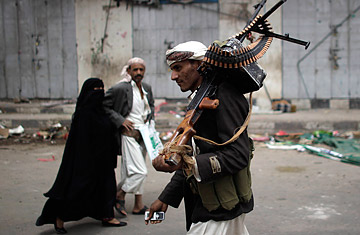
An armed tribesman loyal to tribal leader Sadiq al-Ahmar mans a checkpoint near al-Ahmar's house in Sanaa June 13, 2011.
While a tentative ceasefire keeps Yemen's capital Sana'a in a relative state of tranquility, denizens of the city are aware that the longer political uncertainty drags on, the greater the risk of war becomes. This fear became apparent when the news reached Sana'a last Wednesday that President Ali Abdullah Saleh had had successful surgery in neighboring Saudi Arabia, where he had been whisked to after being severely injured in an attack on his residence.
Chaos erupted in the streets. Red flares, used by the Republican Guards in their 13 day war against the Hashid tribal confederation in the capital to direct fire, were shot from all directions around the city. Familiar with the flares' usual tactical purpose, residents panicked, expecting gunfire to break out all around them. "Run, get in your houses, run," they screamed as they fled what they expected to be incoming fire.
As the flares continued, however, fireworks began to be mixed in with the military signaling technique. And though gunfire began and shook the city, women began to ululate, a sign of festivity. Confused, residents warily made their way out their homes and soon learned that the gunfire was celebratory. "Don't be scared, our president is alive," said Ahmed Salem, a Sana'a resident, urging people out of their homes to join in the seemingly spontaneous expression of joy for the president's recovery.
"I took cover in my house and began thinking of a way out of the city," said Ali Saeed, a local journalist. "But when I heard the women making cries of joy, I realized that all the shooting was in celebration," he added. Even so, joy took its toll. Six people were killed and 59 were injured by errant bullets, according to local press.
And so Yemen remains in limbo, caught between fear and celebrating the health of a leader who is hospitalized in another country. Without a clear head of state or viable government, Yemenis who have remained in cities fear that violence could break at out any moment. Citizens caught in the middle are frustrated and weary, having weathered more than four months of protests, state violence against protesters, and a 13 day long war between loyalist troops and anti-government tribesmen.
Even the apparently immoveable ten city set up by the determined young protesters has been split. Having stood resolutely against bullets and tear gas month after month, the youth movement decided it would leave its Change Square camp to avoid being co-opted by Yemen's political opposition, the Joint Meeting Parties, which set up its own tents in the area and has tried to monopolize its main stage. The independent protesters have now segregated themselves away from the politicans, establishing their own boundaries within Change Square. "We had to establish our own camp. Problems with the JMP happen everywhere," says protest organizer Ameen Dabwan.
But the broader facade of unity that the entire protest movement seemed to enjoy has suffered further erosion. Last week, as protesters marched on the home of acting president Abd Rabo Mansur Hadi, members of the defected 1st armored brigade stopped the march. The rebel soldiers had been protecting protesters since more than 50 unarmed demonstrators were gunned down while leaving Friday prayers at the protest camp in March. For the first time, the month long alliance between the military division and the protesters showed signs of breaking down.
Frustrated, the protesters decided to stage a 24 hours sit-in where they were stopped. They stayed there through the night but as noon approached the next day, members of the 1st Armored Brigade forced them back into Change Square, firing in the air and beating some protesters who refused to leave. Protesters now are scheduling marches against other opposition groups, like the Joint Meeting Parties who are attempting to maintain political relevancy by remaining in the protest camp.
To find a way out of this political stalemate, protesters and the JMP are calling for the formation of a transitional government. Reports of Saleh's condition are varied and confusing and Yemenis are unsure when he will return, if at all. State television has reported that Saleh will make a speech and address the nation "soon." But that is merely a prescription for more anxiety.
